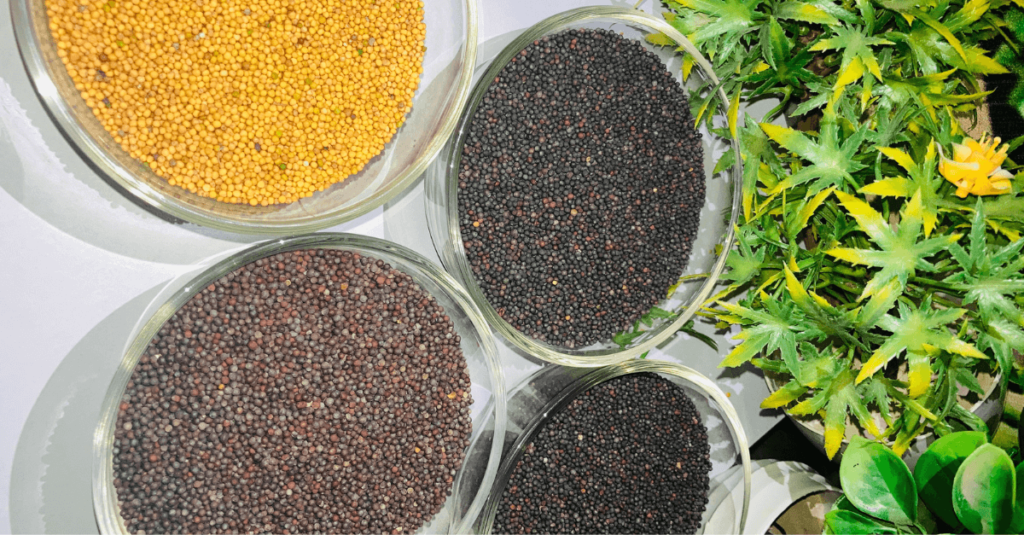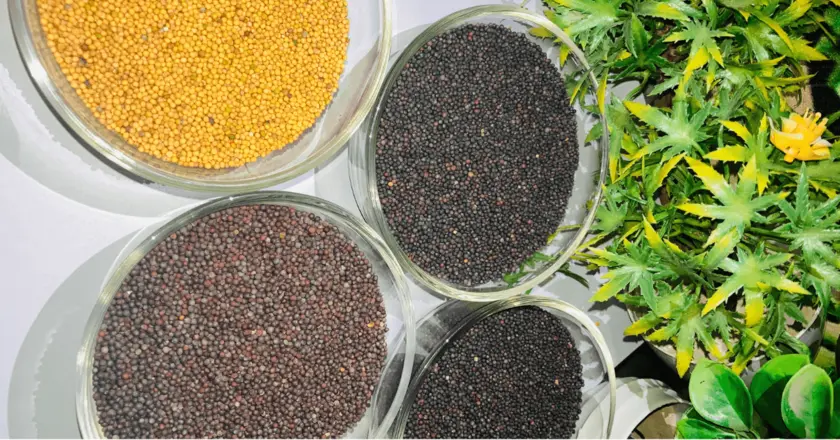Introduction:
Mustard is a plant that belongs to the Brassicaceae family that includes broccoli, cauliflower, and cabbage. It mainly grows for its seeds, which are small and round.
Ever wondered why Mustard seems to be all about pickles and hair care in Pakistan, yet across the borders in India and Bangladesh, it’s the star of so many delicious dishes? Well, you’re in for a treat because this blog is about to solve all the mustard mysteries for you.
Unlike other sources, I’m not just defining mustard seeds. I’m explaining how they change a dish’s flavor when used right. First, you must know, What are mustard seeds, their origin, and why should you include them in your diet?
What Are Mustard Seeds Origin:
Mustard seeds have come with man through the ages. Long ago, people began growing Mustard and used it in ancient Egypt, India, and China. The Romans also used it as a sauce many years ago. Mustard is a spice that has been used for thousands of years. It’s called different names in different languages, like Mustard in English, moutarde in French, and Mostarda in Italian.
What Are Mustard Seeds:
Mustard seeds are grown on the green plant of Mustard with flowers. It looks dry and raw, but cooking with mild heat adds flavour.
Its leaves are used to make sarso sag in Pakistan. Sag is the most famous dish in Pakistan, India, and Bangladesh. Not even in these countries worldwide, Hindustani like to eat sarso saag with rice and chapati. The sources come from the flower pods. You can use each part of the mustard plant for cooking purposes.
Types:
The mustard plant has around 40 species, but only three of them – black (Brassica nigra), brown (B.juncea), and white or yellow (Sinapis alba) – are used to make mustard seeds.

What are Black mustard seeds (Brassica nigra):
Black mustard seeds are not entirely black – they look more like a dark shade of brown. Mustard seeds that are darker in color are hotter and have more flavor.
Black mustard seeds are not widely used compared to brown or yellow and can be hard to find. The darker the seed, the hotter and more intense the flavor is. Black mustard seeds are the smallest in size and have an oval shape. They are rare condiments due to their highly volatile spice. Black mustard seeds have a strong and spicy aroma and flavor. They are popular in Indian cuisine and can be fried in oil to create a sweet and mild taste with a nutty aroma.
Usage:
Black mustard seeds usage is
- Adding to pickles to add flavor
- Using in Indian and Middle Eastern dishes
- Garam masala, for example, can be powdered.
- Creating marinades, salad dressings, and sauces
- Toasting and grinding ingredients to make pastes and powders
They can also be used in medicine to treat conditions such as muscular discomfort, inflammation, and digestion. However, before using them as medicine, always consult with a doctor.
Mustard seeds have another advantage: they possess potent anti-inflammatory properties. In the present day, you need to understand that most diseases, including diabetes, cancer, Alzheimer’s, and thyroid problems, are characterized by inflammation. Excessive inflammation in the body contributes to the development of these conditions.
Prevent cancer:
The compounds in mustard seeds have chemopreventive potential, which may prevent the growth of cancer-causing cells in the body.
Regarding cancer, mustard seeds belong to the crucifer family, similar to vegetables like broccoli and cauliflower. Crucifers contain glucosinolates, which play a significant role in cancer prevention and ensuring proper cell DNA function. They also contain sulfur compounds that substantially impact various types of cancer.
How do tiny seeds prevent you from cancer?
Mustard seeds do not have the power to reverse or prevent cancer, but they can make a positive difference.
Suitable for the digestive system:
Black Mustard seeds are high in fiber and help with bowel movement, especially when added to foods that cause indigestion.
Aids weight loss:
According to a study by the Oxford Polytechnic Institute, eating a tablespoon of mustard seeds daily boost metabolism and help with weight loss.
Yellow mustard seeds:

White to yellowish Mustard has a mild, spicy taste. The mustard plant is harvested for its seeds and leaves, which can be used to make mustard oil, mustard paste, mustard sauce, pickling spice, and mustard flour. Yellow mustard seeds are the most common type found in supermarkets. Yellow mustard seed is not suitable for cooking purposes.
High Erucic Acid and Extracts
Yellow Mustard has more erucic acid than other mustard types, and consuming it could lead to potential health concerns. Eating large amounts of yellow Mustard has been linked to a higher risk of heart issues, including myocardial lipidosis and heart lesions.
Brown Mustard Seeds:
Brown mustard seeds are smaller than other types. They’re also known as Chinese brown Mustard. They taste slightly sour and are spicy. It’s sometimes hard to distinguish brown and black mustard seeds because they look and taste similar. The only difference is their size, which depends on the type of mustard plant they come from.
Mustard seeds also possess excellent qualities for the heart. They are beneficial for individuals with asthma, including children. Adding mustard seeds to your meals can be advantageous for asthma management. They are also helpful for migraine sufferers and individuals with arthritis.
What makes these seeds genuinely remarkable is their composition. They are a rich source of calcium, omega-3, iron, zinc, vitamin A, vitamin K, and fiber, which aids in digestion.
Using Mustard Seeds to Help with Psoriasis:
A study from 2013 looked into how mustard seeds help with inflammation and wounds caused by psoriasis. The researchers studied a special extract from the leaves of the Brassica juncea (L.) Czern plant. They found that this extract treats inflammation and psoriasis-related wounds effectively.
Mustard Seeds Rich in Selenium and Magnesium:
Selenium for Thyroid Health Mustard seeds are packed with selenium, a trace mineral crucial for a healthy thyroid gland. Many people face thyroid issues like Hashimoto’s thyroid or an underactive thyroid. Selenium supports the repair of the thyroid gland. While selenium is also found in Brazil nuts and other sources, it’s in mustard seeds.
Magnesium for Better Sleep Mustard seeds are a great source of magnesium. In various villages, mustard seeds boiled in milk are given to those with sleep problems. Magnesium promotes better sleep by widening blood vessels, enhancing blood flow to the brain, and aiding relaxation.
Incorporating Mustard Seeds into Your Diet Mustard seeds are commonly used in Indian cuisine, added to vegetables, dals, and tempering. They can also be turned into homemade mustard sauce for salads. Including moderate amounts of mustard seeds in your diet is beneficial.
Ready to spice up your meals and boost your health? Try adding mustard seeds to your diet today! From Indian classics to homemade dressings, these tiny seeds pack a punch. Just a pinch a day can make a difference.







